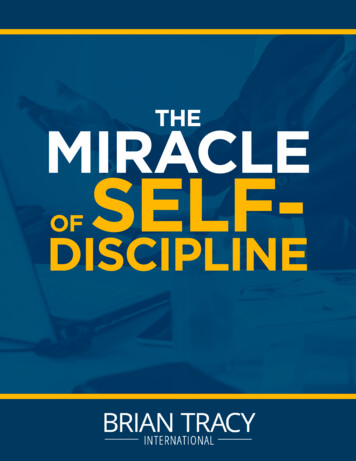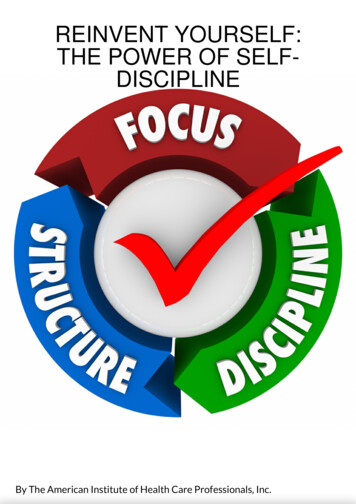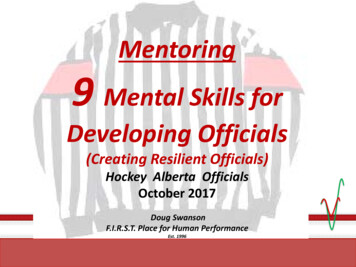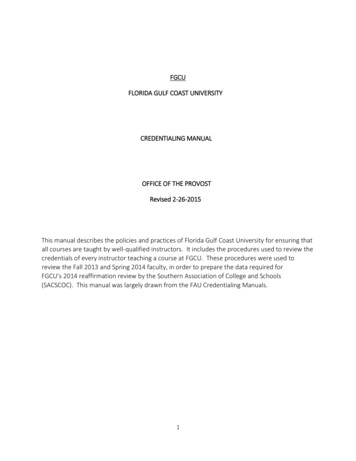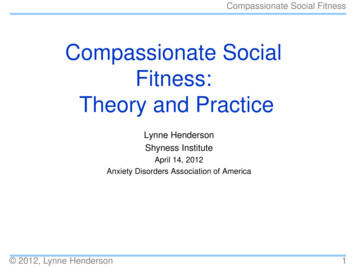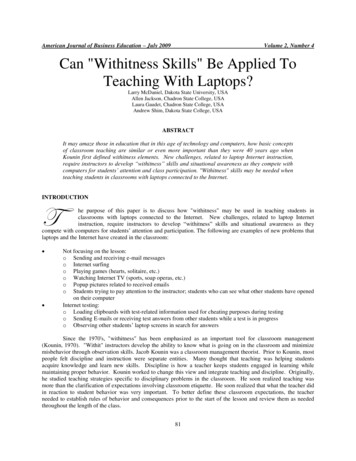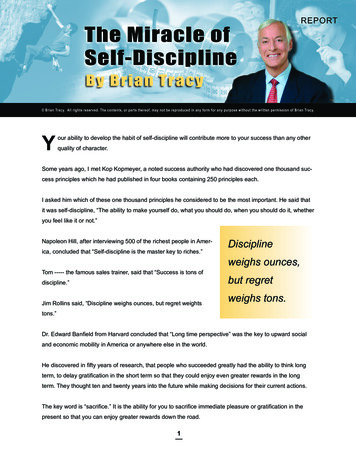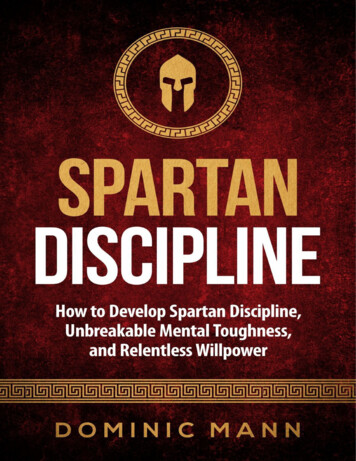
Transcription
Self-Discipline: How to Develop SpartanDiscipline, Unbreakable Mental Toughness, andRelentless WillpowerBy Dominic Mann
YOURS FREEA “Cheat Sheet” for Jaw-Dropping ProductivityEver wished you could get all the very best productivity hacks in one place?Well, here’s your chance.I’m offering a bonus report, 61 Productivity Hacks to Get More Done, that’s exclusiveto my book readers because I want to thank you for your purchase.It’s the ultimate cheat sheet on how to get more done, and you can have it absolutelyfree. For real. Tap here to get this exclusive cheat sheet for FREE
Table of ContentsSelf-Discipline: How to Develop Spartan Discipline, Unbreakable MentalToughness, and Relentless WillpowerTable of ContentsIntroductionSpartan MinimalismToughen UpMind over MatterStoic Self-DisciplineConquer YourselfThe Two Types of WantsGo All the WayInverse Self-DisciplineDelayed GratificationThe Discipline InfectionNo ExcusesWhenever, Wherever, HoweverQuitting Isn't an OptionGo Hard or Go HomeFight Like Your Life Depends on ItStrength Through HumorSpartan HabitsThe Hedonic TreadmillConclusion
Introduction“No man is free, who cannot command himself.”— Pythagoras“Through discipline comes freedom.”— AristotleIn ancient Greece, it was widely accepted that a single Spartan warrior was worthat least three or four non-Spartan soldiers. In fact, the discipline of the Spartans wasso legendary that they evoked the admiration of even their enemies.The famous Greek philosopher Diogenes, when returning from a trip to Sparta,was asked where he was going. Diogenes responded, “From the men’s quarters to thewomen’s.”Similarly, the great Stoic teacher Musonius Rufus noted that the austere Spartanlifestyle, “made their very poverty more enviable than the king of Persia’s wealth.”Likewise, the prominent Greek biographer Plutarch wrote, “All Greeks knowwhat is right, but only the Spartans do it.”Today, the need for self-discipline is as important as ever, if not more so. Yousee, although counterintuitive, discipline is liberating. Self-discipline empowers us topursue that which we truly desire: The achievement of our goals and the attainment ofan exciting and invigorating life.A lack of self-discipline, on the other hand, leaves us succumbing tocounterproductive and unhealthy urges that toss our lives in a direction we don’t trulywant. As Jim Rohn said, “We must all suffer one of two things: the pain of disciplineor the pain of regret.”Contrary to Rohn’s classification of discipline as a pain, I would argue thatdiscipline is a delight—once you get the ball rolling and build momentum, that is. Asyou develop discipline and progress ever more rapidly toward your goals, you willsense a growing tinge of euphoria flood your every moment. You will begin to feellike a Spartan warrior as you go about dominating your life and conquering yourbiggest goals.But the hardest thing is getting started and building that momentum. Unlike theSpartan warriors, we have not been raised in a society that makes a deliberate effort todevelop our self-discipline. If we want to be self-disciplined, we have to develop and
cultivate it within ourselves. Nobody else is going to do that for us.And so that is what this book is for: Giving you the Spartan upbringing younever had.So dive right in and kickstart your development of Spartan self-discipline.
Spartan Minimalism“The purposeful destruction of information is the essence of intelligent work.”— Ray Kurzweil“Our life is frittered away by detail. Simplify, simplify.”— Henry David Thoreau“Simplicity is the ultimate sophistication.”— Leonardo da VinciSelf-discipline is not hard. It is only perceived to be hard. It’s all an illusion—amatter of perspective.Having a cold shower requires no discipline for he who has no hot water system.Eating healthy requires no discipline for he who has no junk food in the kitchen.Being frugal requires no discipline for he who has no money. Obeying the speed limitrequires no discipline for he who drives a Prius.One of the foundations upon which the discipline of the Spartans rest is theirphilosophy of simplicity over decoration and precision over expansiveness. TheSpartan’s achieved discipline not through the exertion of willpower but through thedevelopment of laser-like focus.As Bruce Lee said, “The successful warrior is the average man, with laser-likefocus.”Victor Hugo wrote The Hunchback of Notre Dame butt-naked. Hugo would havehis servant hide his clothes for a specified period of time in order to force himself tostop distracting himself and instead focus on his work.Herman Melville wrote Moby Dick while chained to his desk. Melville wouldhave his wife chain him to his desk in order to force himself to buckle down andfocus on his work.Carl Jung revolutionized the field of psychology by spending days of solitude ina small stone tower in the woods. No electricity. No running water. Not even anycarpet or floorboards. One might even say it was rather spartan. During his periodsat the stone tower, Jung had no choice but to focus on his work.Similarly, the Spartans streamlined and simplified their society to focusexclusively on their main goal: To produce the greatest warriors to ever walk theearth.
Imagine how much you could achieve if you approached your life with this kindof Spartan minimalism. If you eliminated all but that which propels you toward yourgoals. One thing’s for sure: You’d be a heck of a lot closer to your goal(s) than youcurrently are—if not already successful.I have begun applying Spartan minimalism to my own life and have found that,as a result, my focus and productivity has soared.I wear the same simple clothes every day (dark shirt, jeans, and boots). I eatsimilarly simple foods (just meat, vegetables, and eggs). I have also completelyeliminated unproductive habits from my life (such as YouTube, TV shows, and themindless browsing of the internet, news, and social media).A visitor, visiting Sparta for the very first time, once expressed great surprise atthe incredibly plain clothing of King Agesilaus II and other Spartans. Agesilausremarked, “From this mode of life we reap a harvest of liberty.”Simplicity breeds success. Keeping things minimal in nonessential areas of lifemakes room for massive achievement in the areas of life that you have decided aremost important.Many of the world’s most successful people have stumbled upon the value offocus through elimination—of simplicity and Spartan minimalism.Steve Jobs, Mark Zuckerberg, and Christopher Nolan all wear the same clothesevery day. Just as the Spartans discovered over 2,000 years ago, these ultra-successfultrailblazers have found that by simplifying their lives as much as possible, they makemore room for the attainment of excellence.When questioned, Zuckerberg explained that wearing the same clothes every dayfrees him—or as Agesilaus would have said, “reap[s] a harvest of liberty”—to focusexclusively on “how to best serve this community [Facebook].”Likewise, Christopher Nolan explained that his spartan approach to life—such aswearing the same thing every day—enables him to direct increased focus andcreativity toward his craft: Creating mind-blowing films such as Interstellar, TheDark Knight Trilogy, and Inception.Although the Spartans didn’t direct Inception, create Facebook, or invent theiPhone like the pioneers of today (who have nonetheless adopted remarkably spartanapproaches to their lives), the Spartans used this disciplined and minimalist approachto life to allow them to focus exclusively on becoming the best warriors in the world.
Toughen Up“Luxury dilutes hunger.”— Robin Sharma“Luxury comes at the cost of killing your hopes, your dreams, your ambitions. Sotoughen up.”— Tai LopezThe Spartans knew that full bellies don’t plow fields.This fact of life is just as true today as it was during Sparta’s heyday. In fact, inthe technology industry—such as that of Silicon Valley—you come to quickly realizethat the big companies aren’t all that scared of each other. They don’t feel trulythreatened by other big companies.Sure, the so-called “competition” might take some market share from them, butnothing truly life-threatening to the company will come from that direction. Instead,the big players lose sleep over barefoot college dropouts working 18 hours a day,seven days a week in a garage somewhere, eating nothing but ramen noodles.These ramen-eating, sleep-under-the-desk dropouts have the potential to put thebig players out of business.Consider Apple, for example (although you see this trend with most bigcompanies that originally started from scratch). In the late 1990s, Apple was on theverge of bankruptcy, so they brought Steve Jobs back. Facing imminent financialdeath, Apple had to take some serious action.They were in a situation not too dissimilar to that described by Sun Tzu in TheArt of War:“When you surround the enemyAlways allow them an escape route.They must see that there isAn alternative to death.”In other words, be fearful of an enemy with no way out. Do not push too hard onenemies who are desperate. If you back them into a corner, they will lash out with alltheir strength, taking violent and unpredictable action. After all, they have nothing tolose.Back in the late 1990s, Apple was in the exact same situation—financially
speaking. They were backed into a corner with no way out.So what they did was discontinue the majority of their products and pretty muchstart from scratch. They also tried some wacky things, such as making transparentcomputers that came in bold, bright colors. Heck, they even ventured outside of theirown industry to start selling songs for 0.99 and make a music player that couldn’tplay CDs.As Apple started succeeding again, however, they became increasingly cautious.Nowadays they do little more than give their existing products minor facelifts everyyear or two.Remember: Full bellies don’t plough fields.Likewise, F. Scott Fitzgerald started his writing career with great hunger forsuccess. In the military, he managed to write a 120,000 word novel—This Side ofParadise—in three months. He accomplished this awesome feat by working aroundhis strict military schedule, writing through the night on a notebook he hid behind aninfantry textbook.Fueling his hunger for success to even greater heights was the fact that the fatherof his would-be bride stipulated that he needed to have enough money to support herlifestyle before marrying.Upon becoming a literary success and striking fame and fortune, he wrote less,spent more time at parties, wasted most of his nights in town at the clubs, and lost allthe hunger and self-discipline that had got him there in the first place.Unfortunately—but perhaps predictably—Fitzgerald’s very success triggered adramatic decline that took him all the way from being a hugely successful Americanicon to being a broke alcoholic who died in obscurity.Remember: Full bellies don’t plough fields.In Shakespeare’s play, Julius Caesar, the following exchange takes place:“CAESAR:Antonius!ANTONY:Caesar?CAESAR:Let me have men about me that are fat;Sleek-headed [healthy-looking] men and such as sleep o’nights [that sleep atnight]:Yond Cassius has a lean and hungry look;
He thinks too much: such men are dangerous.”In other words, Julius Caesar—a man of extraordinary ambition himself—didn’ttrust Cassius because of his “lean and hungry look.” Caesar would feel less threatenedwere Cassius fat, lazy, and content. In fact, in Shakespeare’s play, Caesar even goeson to say, “Would he were fatter!” (“I wish he were fatter!”). Like the Spartans,Caesar knew that full bellies don’t plow fields and wouldn’t so much as dare to bitethe hand that feeds them.The Spartans, unlike most people, knew better than to become fat, lazy, andcontent. Their disciplined way of life ensured, no matter how great their successes,they would always be “lean and hungry”—always performing at their best andwanting to better themselves. Never satisfied—constructively dissatisfied. Never everfat, lazy, and content.After all, the Spartans knew that full bellies don’t plow fields. They knew thatluxury softens the soul. That luxury deadens one’s energy and intensity.In fact, when King Agesilaus was asked what the greatest benefit Lycurgus—thecreator of Sparta’s constitution—conferred on his countrymen, he replied, “Contemptof pleasure.”That said, this doesn’t mean you should become a masochist. It means you needto form the habit of choosing delayed gratification over instant gratification. In thecase of the Spartans, this meant choosing to become the greatest warriors to have everlived over meaningless orgies and feasts.So toughen up. Be like a Spartan. Block social media. Throw out the batteries inyour TV remote. Tip your couch upside down. Well, that last one might not benecessary, but you get the point.Take a freezing cold shower. Hit the gym. Read books that will arm you with theknowledge you need to achieve your goals—books such as Think and Grow Rich byNapoleon Hill.To conclude this section on toughening up, here is an excerpt from Lectures byMusonius Rufus (the most respected Stoic teacher of the Roman imperial period):“Consider the greatest of the law-givers. Lycurgus, one of the foremost amongthem, drove extravagance out of Sparta and introduced thriftiness. In order to makeSpartans brave, he promoted scarcity rather than excess in their lifestyle. He rejectedluxurious living as a scourge and promoted a willingness to endure pain as ablessing.That Lycurgus was right is shown by the toughness of the young Spartan boyswho were trained to endure hunger, thirst, cold, beatings, and other hardships. Raisedin a strict environment, the ancient Spartans were thought to be and in fact were the
best of the Greeks, and they made their very poverty more enviable than the king ofPersia’s wealth.”
Mind over Matter“Rule your mind or it will rule you.”— Buddha“Whether you think you can, or you can’t—either way you’re right. “— Henry FordYour body can stand almost anything. It’s your mind that you have to convince.Young Spartans started military training at age seven. They were taught toendure immense pain and came to learn that, as modern day Navy SEAL instructorssay, one’s strength isn’t in the size of their biceps. Rather, strength is—according toNavy SEAL instructors—90 percent mental and only 10 percent physical.As such, one of the most important traits developed by young Spartans wasmental strength. The ability to push through pain, hunger, thirst, fatigue, and all theexcuses for laziness tossed their way by the voice in the back of their heads. In otherwords, mind over matter.In his book, Living with a SEAL, Jesse Itzler writes about “the 40 percent rule.”The idea behind this rule is that when you feel dead exhausted and feel like you’vereached your physical limits, you’re really only at 40 percent. You still have another60 percent left in the tank. It’s just that your mind has evolved to be lazy and tryconserve as much energy as possible.However, as we no longer need to worry about sabertooth tigers or not havingany food for a week, we can learn to push ourselves beyond our so-called “limits.” It’sall in the mind.For example, imagine that a bodybuilder has just done an intense workout in thegym. He’s exhausted. He has worked as hard as he believes he possibly could.However, just as he’s leaving the gym, he realizes that a tiger has escaped from thelocal zoo and was waiting for him just outside the gym. All of a sudden, thatexhausted bodybuilder is going to find that other 60 percent and is going to run for hislife.It’s all in the mind. Mind over matter.So toughen up. Develop the ability to continue, even when you feel like you cando no more.Every day, like the Spartans, work to develop your self-discipline. In fact, studies
have found that willpower is like a muscle. One’s willpower strengthens with use.So, for example, a Navy SEAL or Spartan that has spent years breaking throughtheir physical and mental limits and exerting massive amounts of willpower will havea far, far, far easier time sticking to a diet, not watching TV, or exercising discipline inany other areas of life than someone who has spent their entire life having warmshowers, slacking off at a comfortable 9 to 5 job, and going on Netflix binges eachevening.As such, a great way to develop Spartan-like self-discipline and willpower is to,well, start living more like a Spartan. As we discussed earlier, becoming disciplined inone area of life (i.e. keystone habits) leads to you becoming more disciplined in allareas of life.So have cold showers, eat simple foods (e.g. just meat and veggies), and have setperiods of time each day where you unplug (i.e. no TV, internet, social media, etc.).In addition to all that, get into shape. As the ancient Greeks and Spartans used tosay, “a healthy mind in a healthy body.” These days, this sentiment has proven to becorrect. It has been scientifically proven time and time again that physical fitness andhealth are directly correlated with the capacity for dynamic and creative intellectualactivity, as well as the ability for self-discipline.Furthermore, exercise (especially lifting weights) increases testosterone. Coldshowers have also been found to boost one’s testosterone. And this is key, astestosterone is the hormone that fueled such warriors as the Spartans. It’s themasculine hormone associated with strength, muscle mass, sex drive, confidence,aggression (in a good way), and the overall masculine drive that leads to victory in allareas of life.In fact, scientists have actually found a miracle hormone that makes heaps ofmoney and beds lots of women. That’s right, you guessed it: Testosterone.
Stoic Self-Discipline“Nothing happens to anybody which he is not fitted by nature to bear.”— Marcus AureliusStoicism is an ancient philosophy developed by the ancient Greeks, inspired inlarge part by the disciplined and, well, stoic lifestyle lived by the Spartans. Or, in thewords of the scholar P. A. Brunt in his Studies in Stoicism, “Old Sparta apparentlyevoked Stoic admiration, because of the strict and simple life prescribed by Lycurgus[the Spartan lawmaker].”Similarly, when returning from a trip to Sparta, the ancient Greek philosopherDiogenes was asked where he was going. Diogenes replied, “From the men’s quartersto the women’s.” In other words, Diogenes viewed an absence of self-discipline and alack of control over one’s self to be weak and womanly.So how did the Stoics suggest we go about our lives?Well, first of all, the Stoics believed in the power of the mind. Consider some ofthe following thoughts jotted down in the journal of Roman emperor and Stoicphilosopher Marcus Aurelius:“Reject your sense of injury and the injury itself disappears.”“You have power over your mind—not outside events. Realize this, and you willfind strength.”“The soul becomes dyed with the color of its thoughts.”“Today I escaped anxiety. Or no, I discarded it, because it was within me, in myown perceptions—not outside.”Aurelius’ personal notes to himself demonstrate his acknowledgement that allemotions come from within. His state of mind is not the result of external events, butof his own perceptions and thoughts.So next time you find yourself faced with an obstacle and feel resistance, don’tplace the blame and responsibility on external events, forces, people, or objects.Instead, look within.It is not external forces that make us feel how we feel. Rather, it is what we tellourselves—our thoughts—that determine how we feel.The Stoics also placed death at the forefront of their thinking. They would
remind themselves that everything is temporary. Everything comes and goes. Nothinglasts forever. Including one’s own life.This way of thinking provides a sense of urgency, making the thought of wastingtime all that less tempting. In his journal, Aurelius also reminds himself that time isone’s most precious resource:“Not to live as if you had endless years ahead of you. Death overshadows you.While you’re alive and able—be good.”Thinking in this way is essential to developing empowering self-discipline.When you’re on your deathbed, will you wish you spent more time watching TV andmindlessly surfing the web? Of course not!The late Steve Jobs similarly realized the value of approaching life from thisperspective:“Remembering that I’ll be dead soon is the most important tool I’ve everencountered to help me make the big choices in life. Because almost everything — allexternal expectations, all pride, all fear of embarrassment or failure — these thingsjust fall away in the face of death, leaving only what is truly important. Rememberingthat you are going to die is the best way I know to avoid the trap of thinking you havesomething to lose.”Likewise, in his book, The 7 Habits of Highly Effective People, Stephen Coveylists “Habit Two” as “beginning with the end in mind.” In other words, what do youwant people to say about you at your 80th birthday party? What about your funeral?Will it be that you were always up with the latest gossip and great to talk to aboutthe latest episode of the The Bachelor? Or will it be that you did somethingmeaningful with your life? Things that might not have been easy in the moment, butbrought you more satisfaction than an undisciplined life could ever hope toexperience. That you lived rather than compared, learned rather than criticized, and—most importantly—created rather than consumed.Finally, let’s finish this section with something said by Muhammad Ali, thegreatest boxer of all time, when it comes to self-discipline and mind over matter:“I hated every minute of training, but I said, 'Don't quit. Suffer now and live therest of your life as a champion.'”And he did. He lived the rest of his life as a champion. As the “greatest of alltime.” And, speaking of Stephen Covey’s “begin with the end in mind,” Ali’s funeraldrew U.S. presidents, incumbent Turkish president, and over 14,000 others.
Conquer Yourself“Through every generation of the human race there has been a constant war, awar with fear. Those who have the courage to conquer it are made free and those whoare conquered by it are made to suffer until they have the courage to defeat it, ordeath takes them.”— Alexander the Great“In reading the lives of great men, I found that the first victory they won wasover themselves self-discipline with all of them came first.”— Harry S. TrumanThe Spartans knew that to conquer the world you must first conquer yourself.They understood that power comes from within.One of the most unusual things about the city of Sparta was that it had manytemples and statues of gods from ancient Greek mythology. But that’s not the unusualpart. The unusual part is that the Spartans put two of these statues in chains, as ifprisoners.The two statues in chains were Ares, the violent god of war, and his wifeAphrodite, the goddess of love and desire.At first glance, one might be confused by this. Why did they put these twospecific gods in chains? Furthermore, didn’t the Spartans love violence and war?Here’s why: Ares and Aphrodite represent unrestrained emotion. Bloodlust anddesire. Obviously, uncontrolled emotion and indiscriminate action represent theantithesis of self-control and discipline. As such, the fact that the Spartans put thesestatues in chains demonstrates their commitment to controlling the energy of both thedesire of Aphrodite and blind violence of Ares.Fear, sex, and money are ever-present. Recognizing the inherent problems inthese basic human driving forces, the Spartans wisely resolved not to deny theseissues, but to use them to empower themselves.Almost two and half thousand years later, Napoleon Hill—in his book, Think andGrow Rich—discussed the “super power” of transmuting emotions. He advocatedtransmuting emotions such as desire, love, and sex into powerful positive action,while avoiding emotions such as fear, hatred, revenge, and anger.Just like the Spartans.
Hill says that powerful emotions—such as those represented by Ares andAphrodite—“cannot, and should not be submerged or eliminated,” but should instead,“be given an outlet through forms of expression which enrich the body, mind andspirit.” Hill also advised, “If not given this form of outlet, through transmutation,”these powerful emotions will seek outlet in an uncontrolled, non-beneficial (evenharmful), undisciplined manner.So transmute powerful emotions into positive, powerful action. Turn yournervousness into excitement. Turn your sexual energies into an intense workout orcreative effort.Like the Spartans, don’t allow your emotions to conquer you. Instead, conqueryour emotions. Use your emotions as a tool rather than becoming the tool of youremotions. Chain your emotions like the Spartans and use them to make you all themore powerful.
The Two Types of WantsGo All the Way“Everyone must choose one of the two pains: The pain of discipline or the painof regret.”— Jim Rohn“There are two kinds of pain. The sort of pain that makes you strong, or uselesspain. The sort of pain that’s only suffering. I have no patience for useless things.”— Frank Underwood“Through discipline comes freedom.”— AristotleThere are two types of wants in this world. There are the wants of the body andthe wants of the mind.The wants of the body are the things that—in the heat of the moment—we feelwe want. The wants of the mind, on the other hand, are the things we truly want.For example, we often feel like doing little more than sitting on the couch andwatching Netflix while eating straight out of a bucket of ice cream. But is this whatwe truly want? No, of course not!What we truly want is likely some variation of achieving success in the financial,physical, and social areas of our lives. We want the financial freedom to travel, livethe lifestyle we want, and give our loved ones a great life. We want to be physically fitand attractive. We want to have a great social life. These are the things that mostpeople truly want.Unfortunately, these two different types of wants are incompatible. You eitherhave it one way or the other, but you can’t have it both ways.You either eat ice cream or steak and veggies.You either watch TV or hit the gym.You either mindlessly scroll through your Facebook feed or go work ongenerating a second source of income.The Spartans understood this. They knew that you either do one or the other. AsYoda famously said, “Do or do not. There is no try.”
In my own life, I have found this to be so true you wouldn’t believe it. If youwant to accomplish something, you need to either go all in or all out. Take it to theextreme. Be hardcore. Be unrelenting.By failing to be 100 percent committed—extreme, hardcore, relentless—exceptions get made. The occasional bit of junk food. The occasional skipped gymsession. And before we know it, these exceptions become the norm. They becomeincreasingly regular until the point is reached where progress ceases. Things go backto how they were. Goals remain unfulfilled.The highly counterintuitive secret to god-like self-discipline is to take things tothe absolute extreme. It’s easier to do something 100 percent of the time than it is todo something 98 percent of the time. Serious.This mindset was one of the hallmarks of Spartan society. They wereunrelenting. They were hardcore. They took things to the absolute extreme andallowed themselves no exceptions. They had the self-respect to not make excuses forthemselves.If the Spartans would have allowed the occasional exception here and there, theywould have very quickly found themselves descending all the way back down to thelargely undisciplined lifestyles lived by those in neighbouring city-states. Perhapsthey would have allowed themselves the occasional massive orgy and some severaldozen course feasts (requiring self-induced vomiting to continue eating) like theRomans. Before realizing it, Sparta’s dreams of producing the world’s greatestwarriors would be little more than a distant memory. A painful regret.As Charles Bukowski, the American poet, wrote in his poem Roll the Dice, “Ifyou’re going to try, go all the way. Otherwise, don’t even start.”And it’s not just the Spartans that discovered the value of being unrelenting andallowing themselves zero exceptions. One of my favorite modern-day examples is apersonal anecdote famous motivational speaker Zig Ziglar shared in his book Over theTop.Ziglar recounts having made an unbreakable commitment to himself to go for arun early each morning and get in shape. However, one day, after having flown out toSeattle to give a talk and then flying back home on the same day, he found himselfgoing to bed at 4:00 A.M.So obviously he just skipped that day, right?Wrong. In his own words, he said he knew, “that if I made an exception and sleptin because I was tired and sleepy, it would be easier to make an exception the nexttime, and I knew that the exception often becomes the rule. The commitment goes out
the window.”Ziglar later goes so far as to say, “exceptions are the most dangerous things thatwe have to deal with in our lives,” and even refers to smokers and alcoholics whomake an exception and have “just one drink” with tragic results.Inverse Self-Discipline“The good is mostly in the absence of bad.”— EnniusSelf-discipline is almost universally viewed as an act. This view is largelyincorrect. Self-discipline is less about doing and more about not doing. More oftenthan not, as Ennius said, good is in the absence of bad.You see, there are two routes to improvement: You can either do more good ordo less bad. You can do something better or you can make less mistakes.For example, in his book Antifragile, Nassim Taleb mentions that WarrenBuffett’s investment strategy is more about avoiding bad investments than it is abouttrying to somehow magically predict the future to see what companies will do well.You can apply th
Art of War: “When you surround the enemy Always allow them an escape route. They must see that there is An alternative to death.” In other words, be fearful of an enemy with no way out. Do not push too hard on enemies who are desperate. If you back them into a corner, they will
